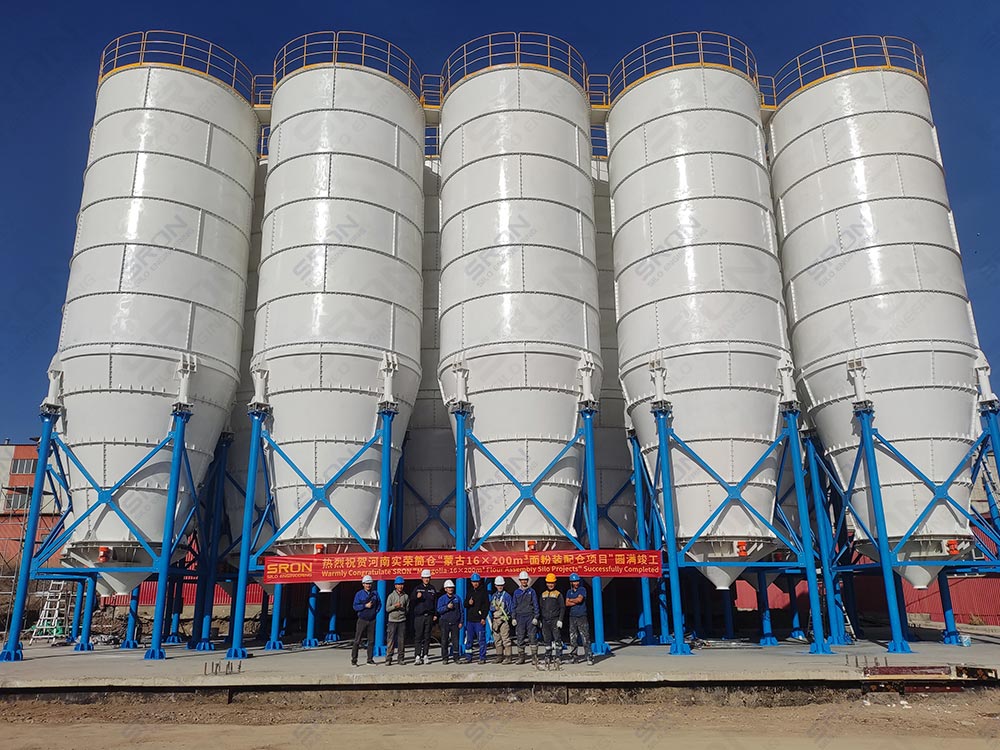FAQ on Hygiene and Cleaning of Food Storage Silo

Why is it important to clean food storage silos
Food storage silos must be cleaned regularly to maintain food safety standards, prevent contamination, and ensure the quality of stored food products. Failure to clean silos can lead to the growth of bacteria, mold, and pests, which can compromise the integrity of the stored food and pose health risks to consumers.
How often should food storage silos be cleaned
The frequency of cleaning depends on several factors, including the type of food stored, environmental conditions, and regulations. Generally, silos should be cleaned on a regular schedule, which could range from weekly to annually. However, it’s essential to monitor the condition of the silo and adjust the cleaning frequency accordingly.
What are the risks of not cleaning food storage silos regularly
Failure to clean food storage silos regularly can result in various risks, including:
- Contamination of stored food with bacteria, mold, or pests
- Spoilage of food products, leading to financial losses
- Compliance violations with food safety regulations
- Compromised quality and reputation of the food products and the company
How is the cleaning process of food storage silos typically conducted
The cleaning process of food storage silos involves several steps:
- Emptying the silo of all remaining food products
- Dry cleaning to remove loose debris, such as dust and crumbs
- Wet cleaning using water, detergent, and sanitizing agents to remove residues and disinfect surfaces
- Rinsing thoroughly to remove cleaning agents and residues
- Drying the silo completely before refilling with food products
What safety precautions should be taken during silo cleaning
Safety is paramount during silo cleaning. Some precautions include:
- Use of appropriate personal protective equipment (PPE) such as gloves, goggles, and respirators
- Ensuring proper ventilation to prevent the buildup of harmful gases
- Implementing lockout/tagout procedures to isolate energy sources and prevent accidents
- Training personnel on safe cleaning procedures and emergency protocols
Can food storage silos be cleaned while they are still in use
Cleaning food storage silos while they are in use is challenging but possible with proper planning and equipment. It may involve rotating between multiple silos to ensure continuous operation while cleaning others. However, it’s essential to follow strict hygiene protocols and prevent cross-contamination between cleaned and uncleaned silos.
Are there regulations governing the cleaning of food storage silos
Yes, various regulations and guidelines govern the cleaning of food storage silos, depending on the jurisdiction and the type of food stored. These regulations typically mandate regular cleaning, sanitation, and maintenance to ensure food safety and compliance with hygiene standards.
What is the requirement by Food Safety ISO 22000 or Halal
ISO 22000, as well as other food safety standards and regulations, does not specifically outline detailed requirements for the cleaning of food storage silos. However, ISO 22000 does emphasize the importance of maintaining a clean and hygienic environment throughout the food supply chain to ensure food safety.
Here’s how ISO 22000 and other relevant standards and regulations may relate to the cleaning of food storage silos:
- ISO 22000: ISO 22000 sets requirements for a food safety management system (FSMS) that encompasses all aspects of food production, including handling, storage, and distribution. While it doesn’t provide specific cleaning procedures for silos, it emphasizes the need for effective cleaning and sanitation practices to prevent contamination and ensure food safety.
- Food Safety Regulations: Depending on the jurisdiction, there may be specific food safety regulations that mandate the cleanliness and hygiene of food storage facilities, including silos. These regulations often require regular cleaning, sanitation, and maintenance to prevent contamination and ensure compliance with food safety standards.
- Halal Certification: For facilities producing halal-certified food products, cleanliness and hygiene are essential to maintain the halal integrity of the products. While halal certification agencies may not have specific guidelines for silo cleaning, they typically require facilities to adhere to stringent cleanliness standards to prevent cross-contamination with non-halal products or ingredients.
In summary, while ISO 22000, food safety regulations, and halal certification requirements may not prescribe detailed guidelines for silo cleaning, they emphasize the importance of cleanliness and hygiene in food storage facilities. Therefore, the cleaning of food storage silos should be conducted in accordance with good manufacturing practices (GMP), hygiene best practices, and any specific requirements outlined by regulatory authorities or certification bodies.
Who is the regulatory agencies
Regulatory agencies overseeing food safety vary by country or region. Here are some examples of prominent regulatory agencies responsible for food safety:
- United States: Food and Drug Administration (FDA) responsibles for regulating and ensuring the safety of food, dietary supplements, and cosmetics in the United States. The FDA enforces regulations outlined in the Food Safety Modernization Act (FSMA) and other legislation.
- European Union: European Food Safety Authority (EFSA) provides independent scientific advice and communication on food-related risks. EFSA’s opinions inform European Union policies and legislation on food safety.
- United Kingdom: Food Standards Agency (FSA) responsibles for food safety and hygiene across the United Kingdom. The FSA sets food safety standards, conducts inspections, and provides guidance to businesses and consumers.
- Canada: Canadian Food Inspection Agency (CFIA) oversees food safety, animal health, and plant health in Canada. The CFIA regulates and inspects food products to ensure compliance with Canadian food safety standards.
- Australia: Food Standards Australia New Zealand (FSANZ) develops food standards for Australia and New Zealand, including regulations related to food safety, labeling, and additives.
- World Health Organization (WHO): While not a regulatory agency in the traditional sense, the WHO sets international standards and guidelines on food safety through its Codex Alimentarius Commission. Codex standards provide a framework for international trade and help harmonize food safety regulations worldwide.
- Malaysia: Ministry of Health Malaysia (MOH) is the primary regulatory authority responsible for ensuring food safety and hygiene in Malaysia. It oversees the enforcement of food safety standards and regulations, conducts inspections, and provides guidance to food businesses. Department of Food Safety and Quality (DFSQ) under the purview of the MOH, the DFSQ is specifically tasked with managing and regulating food safety and quality in Malaysia. It develops and enforces food safety standards, conducts risk assessments, and monitors foodborne illnesses.
- Singapore: Singapore Food Agency (SFA) is the regulatory body responsible for food safety and security in Singapore. It consolidates the functions of several former agencies, including the Agri-Food and Veterinary Authority (AVA). The SFA oversees food safety standards, conducts inspections, and manages food-related regulations and policies.
- Brunei: Food Safety and Quality Control Division (FSQCD) under the Ministry of Health in Brunei, the FSQCD is responsible for ensuring food safety and quality in the country. It regulates food establishments, conducts inspections, and provides guidance on food safety standards and practices.
These are just a few examples, and many other countries have their own regulatory bodies responsible for food safety. It’s important for food businesses to understand and comply with the regulations established by the relevant regulatory agencies in their jurisdiction.
What are the benefits of outsourcing food storage silo cleaning to professional cleaning services
Outsourcing food storage silo cleaning to professional cleaning services offers several benefits:
- Expertise in silo cleaning techniques and safety protocols
- Access to specialized equipment and cleaning agents
- Compliance with food safety regulations and industry standards
- Reduced risk of contamination and foodborne illnesses
- Improved efficiency and cost-effectiveness compared to in-house cleaning
How can I prevent the need for frequent silo cleaning
Preventive measures can help reduce the frequency of silo cleaning:
- Implementing proper hygiene practices during food handling and storage
- Regular inspection and maintenance of silo components to prevent leaks and contamination
- Using appropriate storage conditions, such as temperature and humidity control, to minimize spoilage
- Implementing pest control measures to prevent infestations
Who should I contact for assistance with food storage silo cleaning
You can contact professional cleaning companies specializing in industrial cleaning services. These companies have the expertise, experience, and equipment to handle food storage silo cleaning efficiently and safely. Additionally, you can consult with regulatory agencies or industry associations for recommendations on reputable cleaning service providers.




